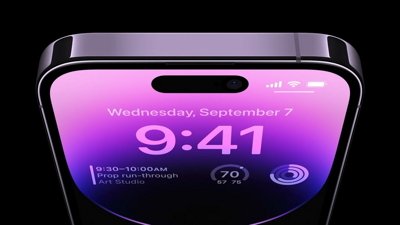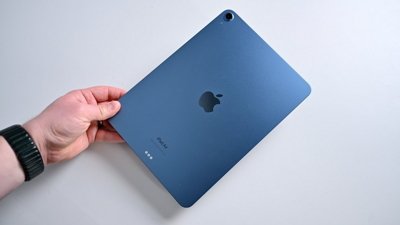Apple again asks for dismissal of iTunes antitrust suit
The class action lawsuit, which alleges that Apple violated federal antitrust laws and California's unfair competition law, was originally filed in January 2005. Later that year, Apple filed a motion to dismiss the case, but the request was denied.
In a recent development to the case, a judge approved last month limited questioning of Apple Chief Executive Steve Jobs regarding a 2004 iTunes update from Apple that disabled a RealNetworks technology, dubbed Harmony, which enabled music purchased from Real's online music store to be transferred to an iPod.
At the time, Apple accused RealNetworks of resorting to "the tactics and ethics of a hacker to break into the iPod." Later that year, Apple quietly released an iPod firmware update that disabled the workaround.
Speaking on behalf of Apple, attorney Robert Mittelstaedt defended on Monday the iPod maker's actions, asserting that the decision to block RealNetworks was intended to improve downloading quality for iTunes customers, Bloomberg reports. Mittelstaedt asked the judge to dismiss the suit, arguing against the claim that Apple's actions were anticompetitive.
“Apple’s view is that iPods work better when consumers use the iTunes jukebox rather than third party software that can cause corruption or other problems,†Mittelstaedt said at a hearing. According to the report, Apple cited 58 "consumer downloading complaints" as the rationale behind the iPod firmware update that 'broke' Harmony.
U.S. District Judge Ware asked whether Apple had conducted "scientific tests" to confirm that other companies' downloads were indeed the cause of the complaints. Mittelstaedt acknowledged that Apple had not performed such tests.
"Bonny Sweeney, a lawyer representing iTunes customers who sued, said the plaintiffs could not locate any legacy software that would allow them to conduct accurate tests," the report read. Ware responded that, given the lack of tests, the trial may come down to a "battle of experts."
Sweeney also revealed that Jobs had met with plaintiff attorneys for questioning on April 12, but declined to provide further details.
Ware will decide by May whether to approve Apple's request to dismiss the case.
Apple is also defending itself in other cases where it has been accused of creating an unfair monopoly with the iPod and iTunes. In 2008, another class action lawsuit was filed against Apple accusing the company of leveraging its FairPlay digital rights management (DRM) technology to lock out competitors.
In 2009, Apple removed DRM from iTunes music purchases, though iTunes movie and television show purchases and rentals still use FairPlay DRM.
 Josh Ong
Josh Ong













 Charles Martin
Charles Martin
 William Gallagher
William Gallagher
 Andrew Orr
Andrew Orr
 Malcolm Owen
Malcolm Owen
 Christine McKee
Christine McKee
 Chip Loder
Chip Loder










27 Comments
I agree with the premise of the lawsuit.
Apple's stranglehold over content is getting worrisome. I hope they have to defend against some lawsuits from print publishers as well.
I agree with the premise of the lawsuit.
Apple's stranglehold over content is getting worrisome. I hope they have to defend against some lawsuits from print publishers as well.
Import anything you want into iTunes, sync with iPod, iPad, iPhone.
Want torrented music?
No problems.
Want music from Amazon?
No worries.
Rip your CD's.
Easy peasy.
The ones who should be sued are the recording industry for insisting on draconian DRM in the first place.
I agree with the premise of the lawsuit.
Apple's stranglehold over content is getting worrisome. I hope they have to defend against some lawsuits from print publishers as well.
I would actually like to have an amazon music store on my device. That is largely irrelevant to this case, but I can dream.
I am not sure how Apple can lose this case. There is no particular behavior that is glaringly anti-competitive. I though all the browser crap against ms was stupid too, so what do I know. MS did some other things that were clearly anti-competitive (OEM Manipulation was the big one). But sound technical considerations that are made to enhance user experience should not be called anti-competitive.
Microsoft released a music player and had a store. The fact that it sucked and used a proprietary music format is not Apple's fault.
I don't really understand this lawsuit. It seems that it's mistaking the itunes app with the itunes store, which are obviously not the same thing. Everybody knows you can bring in music from any source, in a variety of formats, and itunes will stick them into your ipod, and you're good to go. All you have to do is never click the itunes store icon, and you never have to interact with it, and you still get full functionality for your ipod or i-whatever. Is it that the old harmony thing DID use DRM, but made a way to use that DRM'd music in an ipod, and then Apple broke it? Hmm, argument seems weak. Without any sort of deal in place between the 2 companies, realnetworks/harmony/whatever and apple, I don't see how apple could be expected to keep something like somebody ELSE's DRM working on their devices, considering apple never SAID it would work, and the whole point of DRM is control which devices can play a file. I don't know, is this as simple as it seems to me? Or am I missing something? If it's as simple as it seems to me, it seems like apple couldn't possibly lose this lawsuit.
Import anything you want into iTunes, sync with iPod, iPad, iPhone.
Want torrented music?
No problems.
Want music from Amazon?
No worries.
Rip your CD's.
Easy peasy.
The ones who should be sued are the recording industry for insisting on draconian DRM in the first place.
The problem with that is that it requires itunes. iTunes on windows is horrible. It's a huge file that's buggy and whenever it updates it keeps trying to get you to install other things you don't want (like safari). It also locks your device to one computer. What if you buy a CD when you're on vacation and want to put it on your iPod/iPhone for the drive back? Unless you have your computer with you you can't.
So if you have an ipod/iphone you'll need itunes on your PC.
But what if you have iTunes (because you like the genius playlists, which are amazing) but you don't have an ipod. Maybe you have some cheap third party player, or maybe you have an android/blackberry/winmo device and you want to get your playlists over on it. Currently, you can't hook these devices up to itunes and sync with it, at least not directly. Instead, you'll have to download another application (like Doubletwist) and work to sync your playlists that way.
So if you have iTunes and want to easily sync your music, you need an iDevice.
Sure, this is Vertical integration and iDevices SHOULD work very well with iTunes, but at the same time, itunes has an overwhelming majority of the digital music market, which does create a "monopoly" (as stupid as that word is).
I don't know what the specifics of this case are, but I can sympathize with people not being able to sync the way they want.
My first MP3 player was a Creative Zen, and I loved it, but Creative's desktop software sucked, and at the time, iTunes was a better player. But since I had the Zen, I had to drag and drop.
Then I got an ipod, which I also loved (the old "Classic" model) but it was frustrating because I still bought a lot of music by CD's, and I couldn't just drag and drop with it.
I've since stopped using iTunes (AmazonMP3 for Digital, still buy a lot of CD's) so it's not an issue for me. But my brother's having the same struggle I am (Has an iPod, loves his CD's). I don't know how Apple could fix this, or if they'd want to. But the frustration is there.